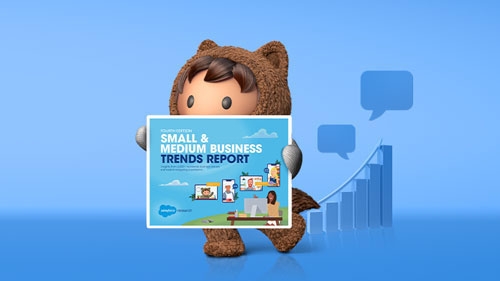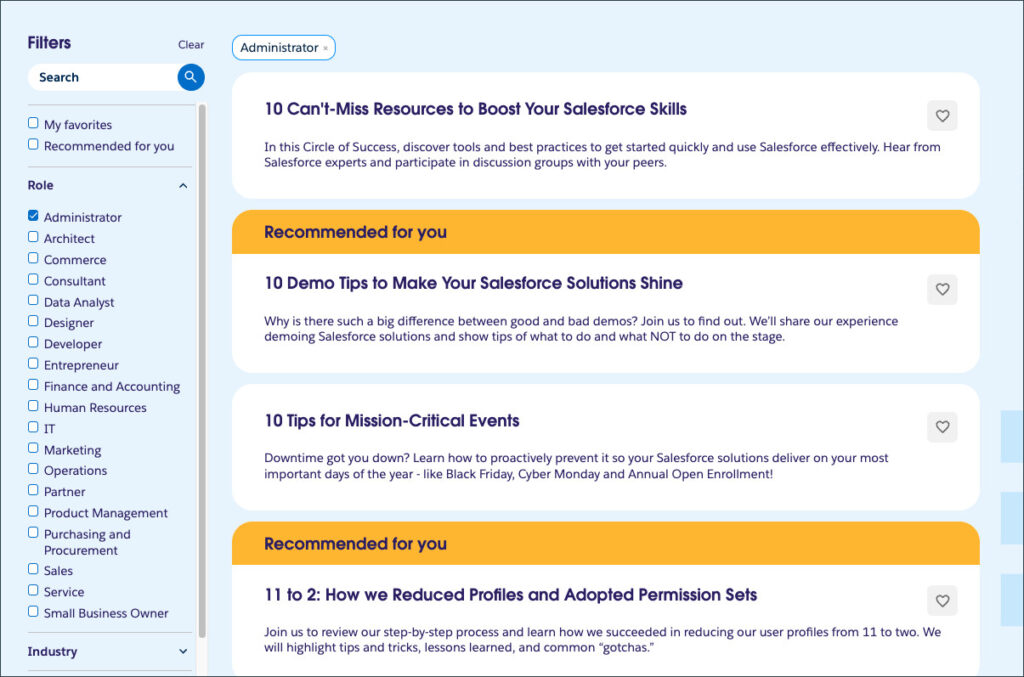The days when websites were just digital business cards and social media was an afterthought are gone. Business models that worked five years ago are becoming as outdated as fax machines in a chatbot world.
Small and medium-sized businesses (SMB)s thrive on adaptability, and those that keep up with technology, stay ahead. According to the latest edition of the Small and Medium Business Trends Report, 73% of growing businesses do, while only 42% of declining ones fall behind. The question isn’t if your business model will change, but whether you’ll lead the way or struggle to keep up. The most successful businesses aren’t the biggest or oldest. They’re the ones that adapt as the market changes. Let’s explore four business models that are staying ahead in 2025 and beyond.
What we’ll cover:
- What is a business model for SMBs?
- AI SaaS and customer experience transformation
- Small-scale marketing agencies and hybrid solutions
- Digital commerce and the retail revolution
- Digital platforms and the sharing economy
- Choosing the right business model for future success
What is a business model for SMBs?
A business model is simply the process of how your SMB makes money. It defines what you sell, whom you sell it to, and why customers choose you over competitors. The business world is changing rapidly. The most successful businesses today aren’t just selling products — they’re creating experiences that keep customers coming back.
Look at subscription models. They’ve changed how we buy everything from software to snacks. Successful businesses now combine digital convenience with real personal touches. When you can turn a one-time customer into a regular relationship, you build something that lasts.
More and more SMBs are exploring flexible, artificial intelligence (AI)-powered technology models like this to stay competitive and to build lasting customer relationships — no matter what the economy.
Start with SMB Basics
Business model #1: AI SaaS and customer experience
AI (Software as a Service) SaaS solutions are cloud-based services that use artificial intelligence to perform specific tasks or provide functionalities. You access these services through the internet, without software installation. These solutions can help with data analysis, automation, customer service, and more — all powered by AI.
What makes AI SaaS special? It works anywhere you do. These tools live in the cloud instead of on your computer, so they’re ready whenever you need them, without complicated installation or maintenance. Your team can collaborate from anywhere in the world, without missing a beat.
AI tools help businesses connect more naturally with their customers by making interactions feel personal and relevant. Instead of sending the same message to everyone, AI can suggest products based on what someone has browsed, clicked, or purchased. It powers things like chatbots that give instant answers, support tools that flag issues early, and recommendations that actually match what people are looking for. In fact, businesses that implement AI for customer experience see a 10-15% increase in revenue and a 15-20% reduction in service costs.
Kickstart your SMB with Starter Suite
See results from day one with a CRM designed for SMBs — the all-in-one suite for productivity. It all starts with Starter Suite.
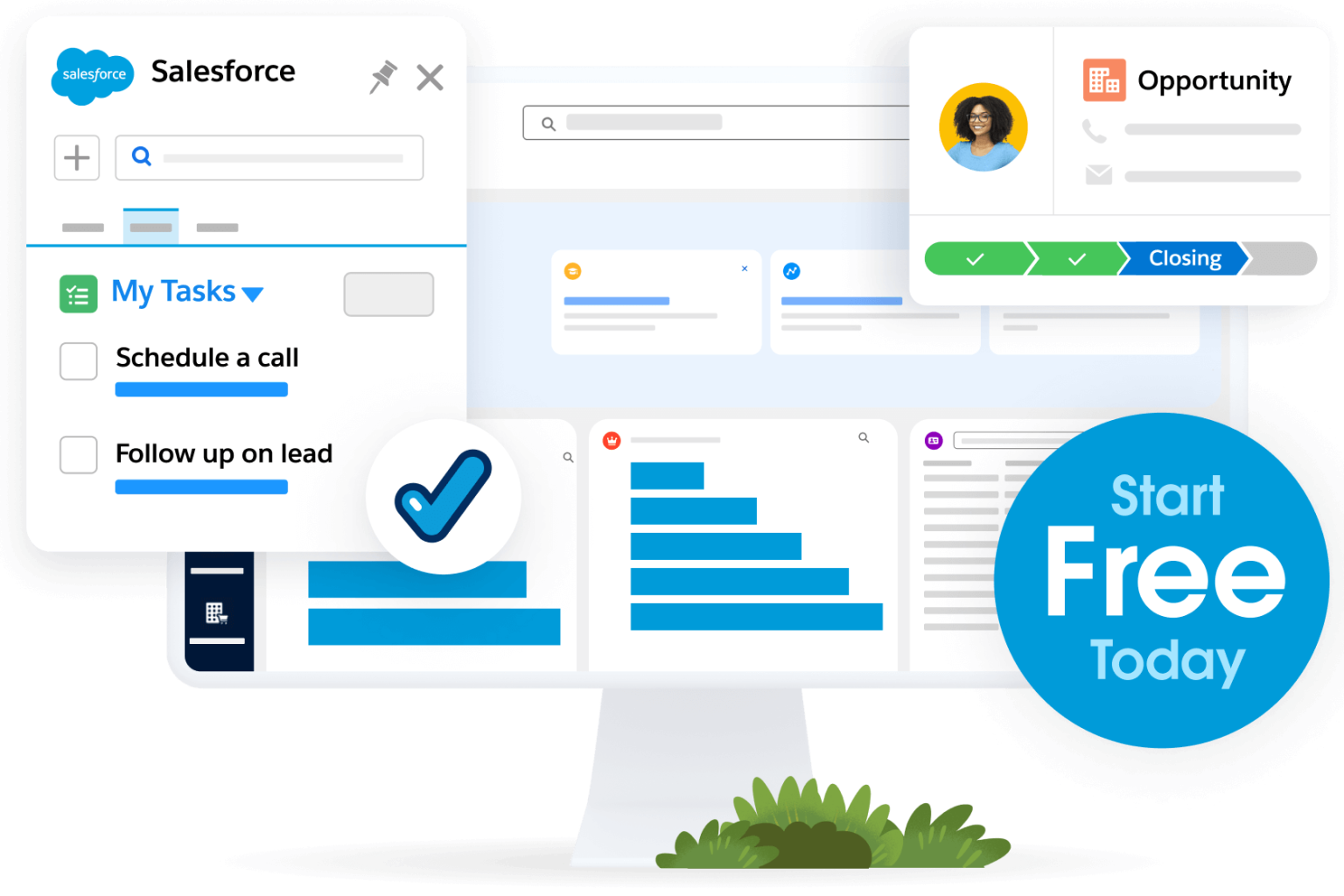
Benefits of AI SaaS for growing businesses
Modern customer relationship management (CRM) systems have evolved from simple contact databases to intelligent growth engines. With built-in AI, they now help small businesses work smarter — automating follow-ups, surfacing key insights from customer data, and delivering more personal experiences at scale.
AI SaaS tools offer:
- AI-integrated help that analyzes customer data, identifies patterns, and suggests effective next steps automatically
- 24/7 customer service, ensuring clients receive assistance around the clock even when you’re unavailable
- Cloud-based technology that gives you access to your business intelligence from anywhere
- Strategic marketing capabilities letting you build and track targeted marketing campaigns without needing a dedicated marketing team
- Personalized customer interactions, where your small team delivers exceptional support by instantly accessing conversation histories, making customers feel valued without requiring constant attention
- Future-ready business operations that scale with your growth while maintaining the personal touch that sets you apart
Challenge
Many SMB owners believe AI is too complex or expensive when just starting out. They don’t understand it, nor have time to try to.
Solution
Modern AI SaaS solutions are designed with simplicity and accessibility in mind. They offer intuitive templates, guided setup, and pricing models that grow with your business, making it easy for even the smallest teams to get started quickly and affordably.
Tools that make it possible
An AI-powered CRM has everything you need to get started on your growth journey. Salesforce brings sales, service, marketing, commerce, and data together in one place. This SaaS platform provides exactly what startups and early-growth businesses need without overwhelming complexity. You get essential contact management that organizes your customer information in one place. AI assistance helps you spot opportunities you might otherwise miss.
You get smart sales tools that track deals and suggest next steps — marketing that knows the best time to reach out; service features like AI chatbots that offer 24/7 help, and commerce tools that personalize the online shopping experience. AI quietly organizes your data, surfaces helpful insights, and keeps your focus on building strong customer relationships.
You can get your data ready with Starter Suite, then scale with Pro Suite as your business grows (and it will, fast!).
Grow Your Small Business With AI Agents
Learn how autonomous AI can scale your small business for efficient growth in our free e-book.
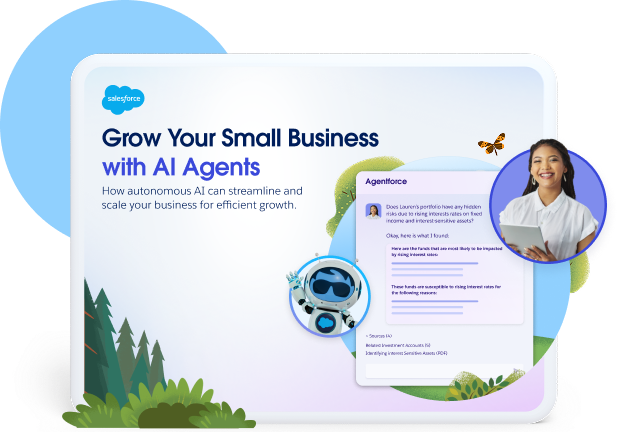
Business model #2: Small-scale marketing agencies
Small-scale marketing agencies are becoming go-to partners for growing businesses. They offer a mix of expert advice and easy tools, giving you the support you need without the cost of a full marketing team or a big agency.
For example, it could be a solo consultant helping a local café plan their Instagram content and set up email newsletters. Or a small team working with startups to improve their website traffic, or social media presence. These agencies keep things simple, affordable, and personal — which is exactly what many small businesses need as they grow.
Benefits for growing businesses
Working with small-scale marketing consultants gives you access to specialist expertise exactly when you need it. Instead of hiring full-time specialists in SEO, content creation, social media, and analytics, you tap into these skills as required. This approach provides enterprise-level marketing capabilities at a fraction of the cost.
These partnerships also offer greater flexibility than traditional agencies. You can scale services up during product launches or down during slower periods. The consulting approach ensures knowledge transfer to your team, building internal capabilities while addressing immediate needs.
What can your growing business do with a marketing CRM?



Challenge
Consulting relationships can be incredibly valuable, but they come with their own set of challenges. One of the biggest is inconsistency. Consultants often work on flexible schedules, making it difficult for businesses to maintain steady momentum. Managing different pricing models or project styles can also be tricky, especially when multiple consultants are involved.
Solution
Modern CRM platforms address these challenges by providing a single source of truth for all customer interactions. When a marketing consultant suggests a new approach, the results are tracked in the same system that houses your historical data. This approach fosters continuous improvement, rather than isolated initiatives, ensuring that your strategies remain aligned and effective over time.
Tools that support consulting relationships
As your business grows to 50–200 employees, the right tools make a big difference. Pro Suite provides advanced features that automate complex tasks, offer data-driven insights, and support your marketing and sales efforts as you expand into new markets. It’s built-in collaboration tools help sales teams manage quotes, contracts, and forecasts, while strong integrations keep everything connected across your systems.
This smart CRM brings essential tools into one simple platform. You get sales templates for consistency, an online store builder that doesn’t require technical skills, and automation that handles routine tasks like follow-ups, reminders, and identifying top leads.
Business model #3: Digital commerce and the retail revolution
Digital commerce has become more than just a way to sell online — it’s a business model reshaping how products are experienced, marketed, and delivered. Modern ecommerce isn’t just about transactions — it’s about creating experiences that bridge the digital-physical divide.
That sofa you’re considering? AR technology lets you place it virtually in your living room, checking if it complements your space before you buy. Those glasses? See exactly how they’ll frame your face without visiting a store.
Benefits for small businesses
The transformation has been especially powerful for small businesses. Local businesses that once struggled to compete with retail giants can now offer immersive shopping experiences. What used to be high-end tech for big brands is now in the hands of small businesses, virtual showrooms and interactive displays included.
What makes this evolution so powerful is how it addresses fundamental human needs — our desire to touch, experience, and connect with products before making them our own. Digital commerce at its best doesn’t feel digital at all. It feels natural, addressing the very hesitations that once made online shopping feel impersonal.
Challenge
Many small businesses worry about going online because they believe it’s too complicated or that they lack the necessary resources. Setting up an online store can seem overwhelming, especially when it involves advanced technology, security concerns, and ensuring the store works well across devices. Additionally, it can be tough to replicate the warm, personal touch of an in-store experience when interacting with customers online.
Solution
The good news is that modern ecommerce tools have simplified the process. You no longer need to be a tech expert. These tools offer ready-to-use templates that look professional, automatically handle complex tasks like security, and ensure your store functions seamlessly on mobile devices. This allows you to focus on what matters most — your products and customers.
Integrated CRM solutions are key to overcoming the challenge of personalizing the online shopping experience. They track customer preferences and purchase history, delivering tailored recommendations to make each shopper feel valued.
And, AI-powered live chat features help answer common questions instantly, ensuring that customers always feel supported during their online shopping experience. Healing the gap between physical and digital experiences, these tools ensure your online store remains as welcoming and customer-centric as your physical one.
Tools that enable modern commerce
Commerce for small business tools make all of this possible. With no-code storefront builders and CRM integration, small teams can deliver polished, personalized shopping journeys. These solutions scale with your business, helping you handle growth without losing the human touch.
Start selling online with Starter Suite
Set up your digital storefront, engage customers, and sell more using a commerce-ready platform with integrated tools for every sale.
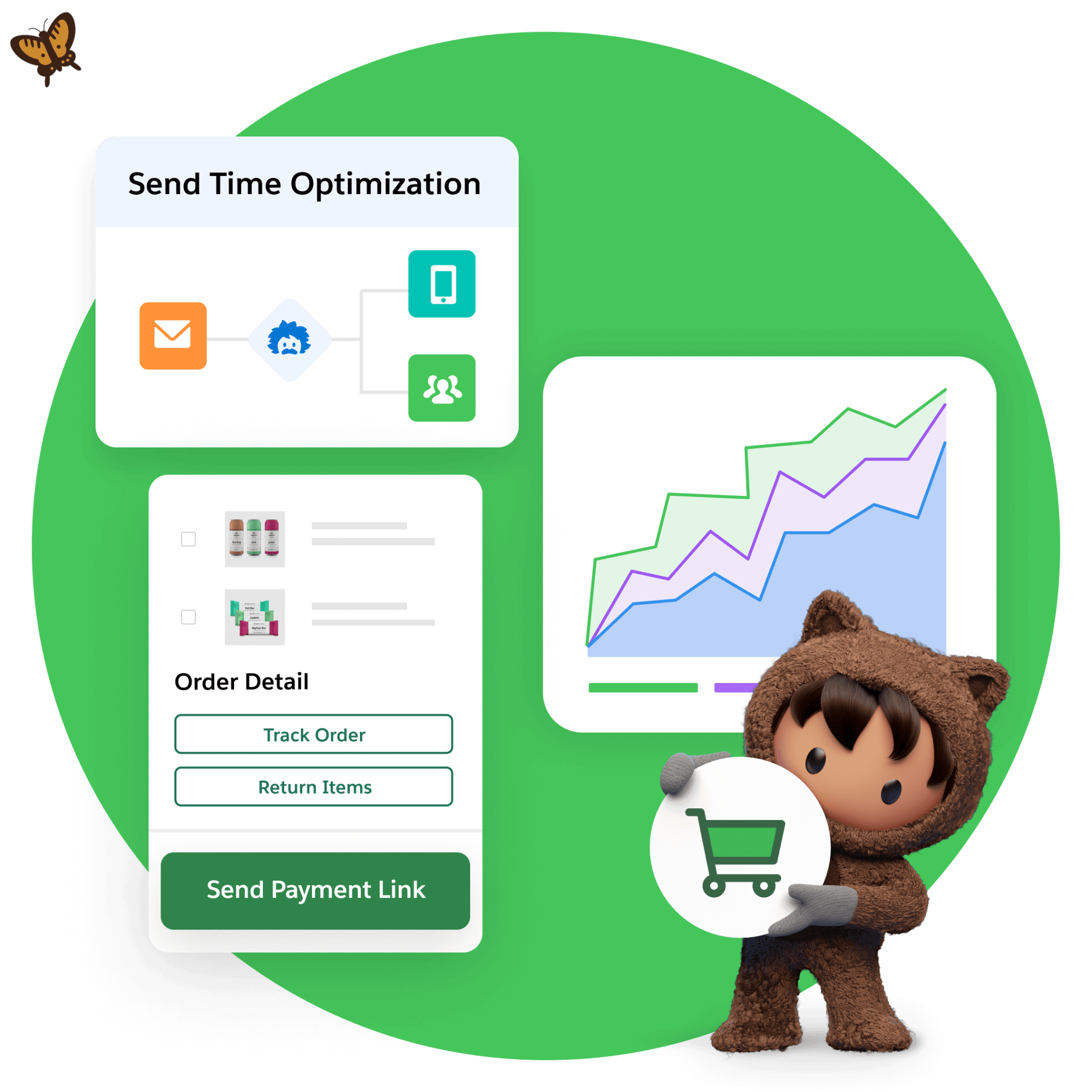
Business model #4: The global sharing economy
The sharing economy is a business model where individuals globally rent or share access to their belongings or residences — like offering a room to rent on Airbnb. It’s a simple yet powerful approach that turns idle resources into income. Digital platforms like Turo, and TaskRabbit make this possible by connecting people who have something to offer with those who need it, even for a short time.
This model is growing because it meets real, everyday needs: 72% of people say it helps them save money, and 55% value the convenience. This approach transforms ordinary possessions into potential income sources. It gives consumers affordable alternatives to sole ownership. Apps facilitate the process by handling matching, payments, and trust-building through reviews.
Benefits for businesses and consumers
This approach converts ordinary possessions into potential income sources and gives consumers affordable alternatives to ownership.
For businesses, the sharing model works because it lets you grow fast without spending a fortune on new assets. You can enter new markets quickly by tapping into resources that are already there. Plus, the more people use these platforms, the better the experience gets for everyone.
Challenge
The sharing economy has a lot of potential, but it’s not without its challenges. One of the biggest challenges is trust. People want to feel safe using the platform and connecting with others. That’s where things like verified profiles, clear reviews, and built-in protections like insurance come in.
Rules and regulations can be tricky too, especially in areas where the law hasn’t caught up with the technology. The most successful businesses deal with this by staying in touch with regulators, joining industry groups, and building compliance into how their platforms work.
Solution
The best platforms also keep an eye out for anything unusual so they can step in if something feels off. Smart platforms use feedback and reviews to spot where someone might need a little extra help or training to keep things running smoothly.
Tools that make sharing work
At the heart of the sharing economy is a solid digital foundation. You need a website and a commerce platform where people can discover, book, and pay for what you offer. Features like smart matching systems help connect your services with the right people at the right time. Easy payment options make the transaction smooth and secure. Ratings and reviews build trust, turning happy customers into advocates.
And, mobile apps allow people to access your services on the go. A CRM ties it all together by helping you manage relationships, understand your audience, and stay connected with the people you sell to.
Seeing is believing. Try Salesforce for free with a 30 day trial.
See how small businesses are using Salesforce CRM to scale fast. No credit card required, no software to install. It all starts with Starter Suite.

Enter a valid e-mail address
Enter a valid e-mail address
Enter a valid e-mail address
Enter a valid e-mail address
Enter a valid e-mail address
Enter a valid e-mail address
Employees
1-20 employees
21-200 employees
201-10,000 employees
10,001+ employees
Select the number of employees
Industry
Automotive
Communications
Financial Services
Healthcare
Tech
Education
Life Sciences
Manufacturing
Media
Nonprofit
Public Sector
Retail & Consumer Goods
Energy & Utilities
Other
Select your industry.
Country/Region
United States
Afghanistan
Albania
Algeria
American Samoa
Andorra
Anguilla
Antarctica
Antigua And Barbuda
Argentina
Armenia
Aruba
Australia
Austria
Azerbaijan
Bahamas, The
Bahrain
Bangladesh
Barbados
Belarus
Belize
Belgium
Benin
Bermuda
Bhutan
Bolivia
Bouvet Is
Bosnia and Herzegovina
Botswana
Brazil
British Indian Ocean Territory
Brunei
Bulgaria
Burkina Faso
Burundi
Cambodia
Cameroon
Canada
Cape Verde
Cayman Is
Central African Republic
Chad
Chile
China
Hong Kong
Macau
Christmas Is
Cocos (Keeling) Is
Colombia
Comoros
Cook Islands
Costa Rica
Cote D’Ivoire (Ivory Coast)
Croatia (Hrvatska)
Cyprus
Czech Republic
Democratic Republic of the Congo
Denmark
Dominica
Dominican Republic
Djibouti
Ecuador
Egypt
El Salvador
Equatorial Guinea
Eritrea
Estonia
Ethiopia
Falkland Is (Is Malvinas)
Faroe Islands
Fiji Islands
Finland
France
French Guiana
French Polynesia
French Southern Territories
F.Y.R.O. Macedonia
Gabon
Gambia, The
Georgia
Germany
Ghana
Gibraltar
Greece
Greenland
Grenada
Guadeloupe
Guam
Guatemala
Guinea
Guinea-Bissau
Guyana
Haiti
Heard and McDonald Is
Honduras
Hungary
Iceland
India
Indonesia
Ireland
Israel
Italy
Jamaica
Japan
Jordan
Kazakhstan
Kenya
Kiribati
Korea, South
Kuwait
Kyrgyzstan
Laos
Latvia
Lebanon
Lesotho
Liberia
Liechtenstein
Lithuania
Luxembourg
Madagascar
Malawi
Malaysia
Maldives
Mali
Malta
Marshall Is
Mauritania
Mauritius
Martinique
Mayotte
Mexico
Micronesia
Moldova
Monaco
Mongolia
Montserrat
Morocco
Mozambique
Myanmar
Namibia
Nauru
Nepal
Netherlands, The
Netherlands Antilles
New Caledonia
New Zealand
Nicaragua
Niger
Nigeria
Niue
Norway
Norfolk Island
Northern Mariana Is
Oman
Pakistan
Palau
Panama
Papua new Guinea
Paraguay
Peru
Philippines
Pitcairn Island
Poland
Portugal
Puerto Rico
Qatar
Republic of the Congo
Reunion
Romania
Russia
Rwanda
Saint Helena
Saint Kitts And Nevis
Saint Lucia
Saint Pierre and Miquelon
Saint Vincent And The Grenadines
Samoa
San Marino
Sao Tome and Principe
Saudi Arabia
Senegal
Serbia
Seychelles
Sierra Leone
Singapore
Slovakia
Slovenia
Solomon Islands
Somalia
South Africa
South Georgia & The S. Sandwich Is
Spain
Sri Lanka
Suriname
Svalbard And Jan Mayen Is
Swaziland
Sweden
Switzerland
Taiwan
Tajikistan
Tanzania
Thailand
Timor-Leste
Togo
Tokelau
Tonga
Trinidad And Tobago
Tunisia
Turkey
Turks And Caicos Is
Turkmenistan
Tuvalu
Uganda
Ukraine
United Arab Emirates
United Kingdom
United States Minor Outlying Is
Uruguay
Uzbekistan
Vanuatu
Vatican City State (Holy See)
Venezuela
Vietnam
Virgin Islands (British)
Virgin Islands (US)
Wallis And Futuna Islands
Western Sahara
Yemen
Zambia
Zimbabwe
Select your Country
State/province
北海道 – Hokkaido
青森県 – Aomori
岩手県 – Iwate
宮城県 – Miyagi
秋田県 – Akita
山形県 – Yamagata
福島県 – Fukushima
茨城県 – Ibaraki
栃木県 – Tochigi
群馬県 – Gunma
埼玉県 – Saitama
千葉県 – Chiba
東京都 – Tokyo
神奈川県 – Kanagawa
新潟県 – Niigata
富山県 – Toyama
石川県 – Ishikawa
福井県 – Fukui
山梨県 – Yamanashi
長野県 – Nagano
岐阜県 – Gifu
静岡県 – Shizuoka
愛知県 – Aichi
三重県 – Mie
滋賀県 – Shiga
京都府 – Kyoto
大阪府 – Osaka
兵庫県 – Hyogo
奈良県 – Nara
和歌山県 – Wakayama
鳥取県 – Tottori
島根県 – Shimane
岡山県 – Okayama
広島県 – Hiroshima
山口県 – Yamaguchi
徳島県 – Tokushima
香川県 – Kagawa
愛媛県 – Ehime
高知県 – Kochi
福岡県 – Fukuoka
佐賀県 – Saga
長崎県 – Nagasaki
熊本県 – Kumamoto
大分県 – Oita
宮崎県 – Miyazaki
鹿児島県 – Kagoshima
沖縄県 – Okinawa
Select a state/province
State/province
Alberta
British Columbia
Manitoba
New Brunswick
Newfoundland
Northwest Territories
Nova Scotia
Nunavut
Ontario
Prince Edward Island
Quebec
Saskatchewan
Yukon
Select a state/province
State/province
Alabama
Alaska
Arizona
Arkansas
California
Colorado
Connecticut
Delaware
District of Columbia
Florida
Georgia
Hawaii
Idaho
Illinois
Indiana
Iowa
Kansas
Kentucky
Louisiana
Maine
Maryland
Massachusetts
Michigan
Minnesota
Mississippi
Missouri
Montana
Nebraska
Nevada
New Hampshire
New Jersey
New Mexico
New York
North Carolina
North Dakota
Ohio
Oklahoma
Oregon
Pennsylvania
Rhode Island
South Carolina
South Dakota
Tennessee
Texas
Utah
Vermont
Virginia
Washington
West Virginia
Wisconsin
Wyoming
Select a state/province
We value your privacy. To learn more, visit our Privacy Statement.
Thank you!
Choosing the right business model for future success
Finding the right business model is just as important as having a great product. The way you make money and deliver value can make all the difference in today’s changing market. Tomorrow’s winners won’t necessarily be the biggest organizations, but those that can adapt quickly and spot opportunities in every change. Ready to build a business model that grows with you?
Start your journey with a free trial of Starter Suite today. Looking for more customization? Explore Pro Suite. Already a Salesforce customer? Activate Foundations today to try Agentforce.
AI supported the writers and editors who created this article.


